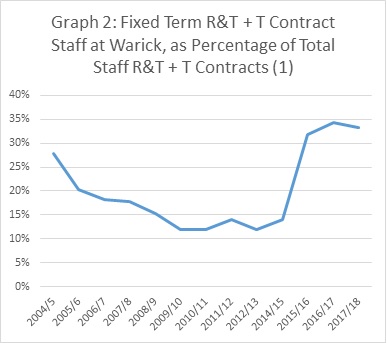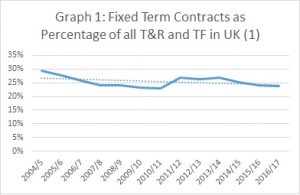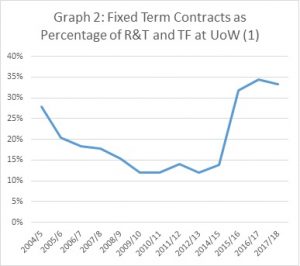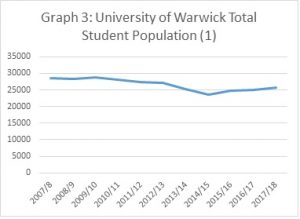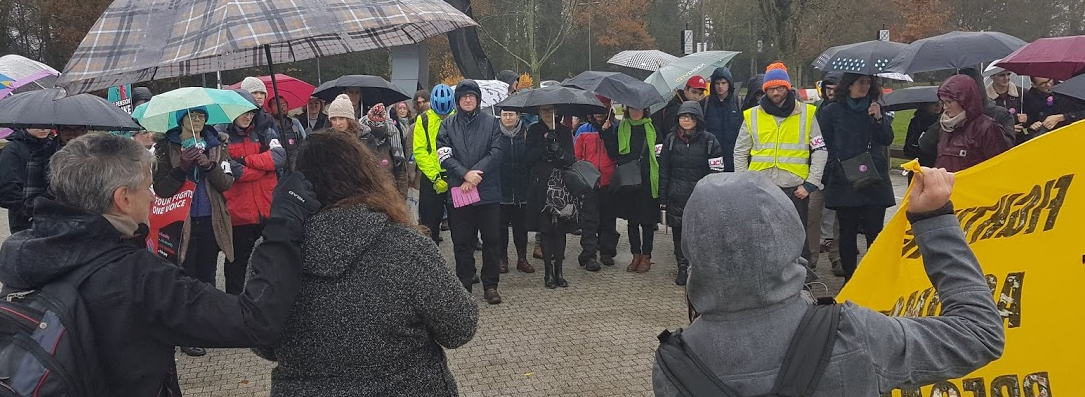*A PDF version is available here for printing and distribution.
This is a two-ballot campaign, but the issues are united: it is a strike about dignity and equality. It is a strike about casualisation; about the pay gap for women, BMEs, and gay, lesbian, and queer staff; and it is a strike about whether we will be able to grow old with dignity. These issues are all connected, but we are going to talk a bit about the two ballots separately.
Pensions
We were just on strike about pensions just less than two years ago? Why are we doing out again?
When we agreed to end the strike of 2018, it was because of a commitment from UUK and USS that they were willing to disregard their previous valuation and set up a Joint Expert Panel (JEP) to carry out a new valuation. The problem with the old valuation process is that it led to conflict every three years in line with the valuation cycle; UCU argued and continues to argue that a fairer process, based on more reasonable assumptions will allow us to defend our pension benefits and move us away from these cyclical clashes.
The JEP’s report largely validated UCU’s position and made a number of recommendations. However, the USS has refused to accept the recommendations and valuations of the Joint Expert Panel (JEP), and instead scheduled massive contribution increases clearly violating our own ‘no detriment’ position. Our contributions will rise to 9.6% of salary from October 2019, and 11% of salary from October 2021.
Ok, but it’s only a couple percentage points. Won’t we lose that money anyways in the strike?
It’s true that it’s only a couple of percentage points now (though a couple of percentage points that will, over your career, take a big bite out of your salary), but this strike is really about defending the valuation process we were promised during the last strike in order to secure the future of our pension fund.
The last year has shown that the USS cannot be trusted and that when push comes to shove, our employers, UUK, aren’t willing to fight them. We were told that USS would accept the JEP’s valuation and this hasn’t happened. USS have shown that they will only accept valuations that work for them. If we don’t pressure UUK to stand up to UUK and if we don’t force USS to make good on their word, they will demand more increases every year until our pension is no longer sustainable.
Moreover, we have already lost so much. UCU commissioned a study that compared the situation members are in now to if the Scheme had continued in its pre-2011 state and found that for the average UCU member, your pension will cost 40k more, and will give you 200k less. We need to draw a line in the sand now.
I thought we struck to save our defined benefit pensions. Are they safe now?
Not really. Whilst they aren’t explicitly coming for our DB pensions this time, this is another way to destroy our pension. By making our pensions unaffordable, more and more people will drop out and then defined benefit could then be at risk. Pensions need to be affordable for members to be sustainable.
Moreover, without valuation methodology which we can support, the chances of VCs pushing for de-risking (i.e. moving to defined contributions) at future valuation cycles are necessarily higher.
But if USS says our pensions aren’t sustainable, don’t we risk losing our pensions anyways?
Our pensions are sustainable. The myth of unsustainable pensions comes from USS treating our pensions as if the HE sector is a company like Carillion. But the HE sector is nothing like Carillion. It is far larger and far more stable.
Ok, I get why we’d want to take action against USS. But that’s not the way which industrial action works. We’re striking against Warwick and Warwick’s position on pensions has been pretty good.
We need a ballot, paradoxically, to support Warwick’s position. Employers across the country are losing faith in the USS, and some (like our own) are starting to raise their voice, but neither their voice nor ours is being listened to. If we don’t push back now, USS will tighten their grip, and will almost assuredly ignore the second report of the JEP, employers will start planning to mitigate against the USS valuation, and this will pose enormous problems and instabilities for our pension.
If we didn’t win last time, how are we going to win this time?
We won the battle last time: we stopped them from eliminating our defined benefit pensions. Now we need to finish what we started by ensuring that USS does what they promised they’d do and listen to the JEP’s valuation.
Pay & Equality
In a time of rising unemployment, should we be grateful to be receiving a pay rise of 1.8%?
The employer’s 2% pay offer is below inflation and that means that it is a pay cut. Since 2009 average pay in HE has dropped in real terms by 17.8% (Retail Price Index) or 11.8% (Consumer Price Index). This in a context in which Warwick currently makes a surplus of £40-50 million a year. The University, and the sector can afford our demands.
But aren’t there more pressing concerns, such as the gender and race pay gap and casualisation?
Absolutely, but these concerns are intimately connected. This Pay Cut Disproportionately Affects Women, Ethnic Minorities, and Casualised Staff. At the same time as Universities are promoting diversity and equality programs to increase the number of women and BME staff, in real terms they are cutting our salaries, and increasingly casualising our workforce.
Gendered Pay Gap: According to The Boar, Warwick had the second worst Gender Pay gap of the Russell Group as of 2016 and more recent figures from the government are just as damning. Women’s mean hourly rate is 26.5% lower than men’s, which means that women earn 74p for every £1 that men earn. And women’s mean bonus pay is 58.4% lower than men’s.
BME Pay Gap: The situation is no better when it comes to race. According to the BBC, ethnic minority academics at Warwick are paid an average 25% less than their white colleagues. And there are only 26 black women professors in the UK and a persistent culture of racism and bullying.
LGBTQ+: Pay Gap: Staff identifying as LGBTQ+ have long experienced marginalising treatment within UK HE (UCU 2009; GEO 2016; UCU 2018). This has included inequalities as manifest in the pay gap within Universities (AUT 2001) as is the case elsewhere (People Management 2019). Sadly, the failure of institutions to collect the necessary data for this analysis has itself remained an issue (EHRC 2019; UNISON 2018).
If the university sector is serious about closing the gender and racial pay gap and changing its culture, it needs to stop degrading the conditions of the very staff its ostensibly attracting.
How does casualisation fit into a ballot about pay? And what is casualisation?
‘Casualisation’ is the process through which employers whittle away the protections, rights, and security of their employees, by moving away from employing people on a full-time and permanent basis to using hourly-paid work, zero-hours contracts, temporary workers contracts, and other similar kinds of contracts. Casualised contracts mean that all staff – both permanent and casualised – feel more precarious and less able to stand up for their rights. And this means our employers can erode our pay and working conditions. A fair wage is only possible if we stamp out casualised contracts.
But is casualisation that widespread?
The use of casualised contracts is soaring. According to HESA, as of 2016-7, 50.9% of academic staff are on insecure contracts. At Warwick it’s even worse, with two thirds, or 66.5%, of staff on fixed-term or hourly-paid contracts. Moreover, Warwick made national news in 2015 when they tried to innovate a whole new system for “in-sourcing” called Teach Higher in which the university tried to create a wholly-owned subsidiary to hire and manage hourly paid staff, thus denying those staff any employee rights. It was only a mass mobilisation by students and staff that stopped this from happening. It was also this resistance that led to the creation of the current payroll system, Sessional Teaching Payroll or STP.
But hasn’t Warwick committed to ending casualised contracts?Sort of. Because of the great work of our anti-casualisation reps and Warwick Anti-Casualisation, the University has agreed to try and introduce employmentcontracts for PhD students currently engaged via STP for the coming year . The details have yet to be finalised and the broad direction of travel has yet to be finalised.
Sounds good, right?
In principle. However, the devil is in details. While the University claims to be ending casualised work, it’s practices suggest that it is committed to upholding a two-tiered workforce. The University has refused to look at the current STP framework as part of the process of contractual change, including the issues of workload and pay, a matter of negotiation, instead offering only “consultation.” preferring to simply ‘consult’ with the union and with STP employed staff with no promises of taking their suggestions into account.
Moreover, the University has also refused to address the key issues of workload and pay for casualised staff. According to the UCU’s recent report on casualisation, 60% of casualised staff work well beyond their hours, but the University has refused to open up the STP framework for discussion and thus to address the problem of unpaid labour. The formal change to permanent contracts is welcome, but without a commitment to ending workload increases and unpaid labour, it doesn’t actually address the problem of casualisation.



